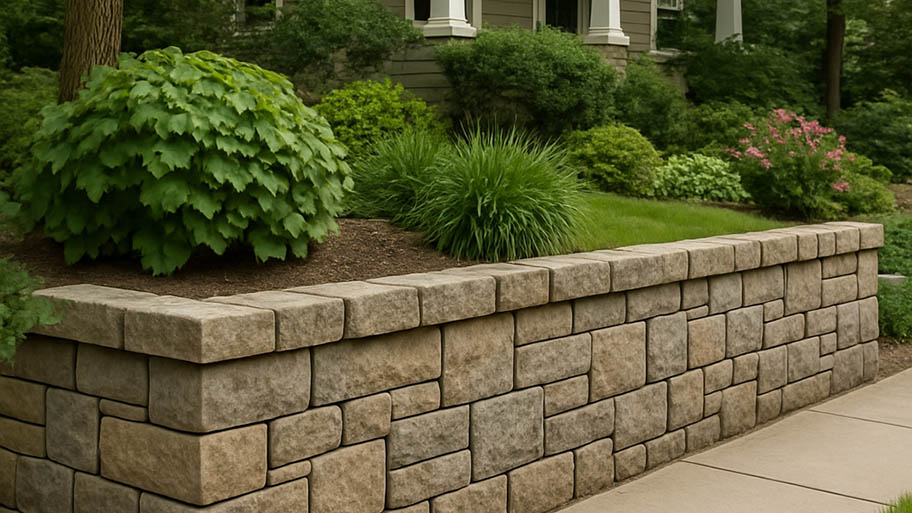
Kick erosion to the curb with an eye-catching retaining wall. Retaining wall costs vary based on the material, but this guide will help you budget.
Pavers and hardscaping service costs depend on your project and location. Check with a local pro for your specific job.
Most retaining wall repairs involve reinforcing and stabilizing the foundation.
A wall's height, length, and materials all determine retaining wall repair cost.
In some cases, your retaining wall repair professional may recommend bringing in a structural engineer.
Aside from cases of severe retaining wall failure due to poor original construction, repairing a wall can be a significantly more cost-effective option than building a new one.
A home's retaining wall provides important protection against erosion and soil instability. Over time, constant pressure and weather-related wear and tear can cause problems. To fix a retaining wall, most homeowners pay around $700. However, retaining wall repair cost can range from $450 to $950. Keep reading to learn everything that goes into the cost of repairing a retaining wall as you budget for the project.

Retaining walls are generally built custom for a yard's terrain and soil conditions, so repair costs can be unique to a property. Here are the major factors impacting how much you'll pay to repair a damaged retaining wall.

From superficial damage to structural shifts, retaining walls can undergo a wide range of changes over the years that require attention.
| Problem | Description | Cost Range |
|---|---|---|
| Efflorescence | White residue from evaporated salt | $220–$480 |
| Leaking or seeping | Water or soil seeping through cracks or broken mortar | $220–$990 |
| Cracking and crumbling | Damage from erosion or weather exposure | $335–$1,100 |
| Shifted foundation | Pressure-related wall shifting | $650–$1,200 |
| Bowing or leaning | Bulge spot on wall | $275–$1,200 |
Efflorescence is a white residue that crawls along a retaining wall's surface. With efflorescence on a stone wall being caused by water that's carrying salt, it's important to address the moisture source. In many cases, installing a moisture barrier on the wall's backside and installing a drain system to keep water from the surface of the wall will solve the problem. In general, this can be done for a cost of $220 to $500. Cleaning a retaining wall with water and vinegar or applying water repellents or coatings costing $18 to $35 can address superficial or minor efflorescence.
If a retaining wall is subject to constant leaks or seepage, the solution may be to add drainage and ventilation that allow water to pass through in a controlled way. If you choose to solve the problem using drainage pipes, expect to pay $50 to $80 per square foot of piping. When adding weep holes by drilling through the retaining wall, the cost is $60 to $75 per square foot. If additional backfill is needed to help with drainage, the cost generally runs from $6 to $25 per cubic yard.
If a retaining wall shows signs of cracking and crumbling, straightening and reinforcement may be needed. If a professional recommends thickening the base of the wall by adding new concrete and mortar, the price may range from $60 to $90 per square foot.
On average, repairing a shifting or unstable retaining wall foundation will require anchoring at a cost of $60 to $80 per square foot. Thickening the foundation by applying new mortar and concrete can cost an additional $60 to $90 per square foot. Depending on the extent of the foundation damage, backfill and excavation work could bring the cost of thickening the base to $95 to $115 per square foot. If new footings need to be added to secure the wall, expect to pay between $18 and $50 per linear foot for materials and installation.
Anchoring is often recommended when a retaining wall is leaning forward. The most efficient way to add anchoring is to drive large rods through the wall that will be attached to an anchor. Steel rebar used to reinforce a retaining wall foundation generally costs $2.50 to $5 per square foot. Correcting a bowing or leaning retaining wall overall generally costs $65 to $85 per square foot.
Just like prices can vary by material when building a new retaining wall, prices also differ by material when it comes to repairs. From the difficulty of repairing certain types of stones compared to others to replacement costs for damaged stones, stone types weigh into this project's final cost.
| Wall material | Cost per square foot |
|---|---|
| Natural stone | $15–$45 |
| Block stone | $18–$50 |
| Brick | $8–$18 |
| Concrete or cinder blocks | $11–$29 |
On average, masonry pros and landscaping contractors charge anywhere from $50 to $109 per hour for retaining wall repairs. In general, costs reflect a wall's size and accessibility. For repairs related to severe foundation issues or retaining wall failure, your contractor may recommend bringing in a structural engineer to answer some retaining wall questions at an average cost of $100 to $220 per hour.
In most cases, permits are only required if you intend to dramatically change the footprint or design of an existing retaining wall. In most cities, retaining walls under 4 feet in height are exempt from permits. On average, permits for large-scale retaining wall repair projects can cost between $50 and $200.

With the average cost to build a retaining wall ranging from $3,203 to $9,208, the cost to fix a leaning retaining wall can be significantly cheaper and easier compared to hiring a pro to build a retaining wall from scratch or learning how to build a retaining wall yourself. When comparing the cost to repair versus replacing a retaining wall, homeowners should factor in demolition and removal costs ranging from $10 to $20 per linear foot that add up to $2,200 to $4,500 on average for most projects.
For most homeowners, repairing a retaining wall is a better and more cost-effective option if the wall is capable of sustaining the repairs needed. In addition, repairing is the right route if repairs are at least 75% to 50% less expensive compared to a new build. If the old wall is unsalvageable, it's wise to get it replaced as soon as possible to prevent severe erosion or sloping. Signs that a retaining wall is unsalvageable or not worth saving include shallow footings, lack of weep holes, significant leaning, and wide cracks. If you do choose to replace the wall, the existing one should not be removed without another stabilization plan in place.
Building a retaining wall is challenging work that requires precision and expertise to safely handle the weight of the materials. Hiring a local retaining wall installation professional will reduce the risk of injury and structural collapse that are possible with a DIY job.
Some of the advantages you receive when hiring a retaining wall pro include:
Building a retaining wall is a more complex task than it may appear at first glance.
Professionals might be able to help you obtain the materials at a discount from a distributor and transport them for you.
If you need the wall built quickly, professional teams will have plenty of employees available to speed up the process.
Retaining wall materials are extremely heavy, making them challenging to deliver and install for a DIYer.
If you need a wall taller than 4 feet, professionals will obtain the necessary permits, as required by your local regulations.
In areas with moisture problems, experts will dig a trench, pour drainage gravel, and add backfill material to protect the wall from failing.
For a wall that must prevent erosion, a professional will use the right materials and design to withstand the weight of the earth behind it.
Professionals can suggest materials that are effective for the wall while also adding a decorative hardscape element to your landscaping.
If you’re not comfortable building a retaining wall yourself, you can save time for the professional by doing the following:
Tightly mow the area where the wall will be built
Remove any toys, existing fences, or old wall materials from the site
Create an area to temporarily store extra blocks
Move your vehicles to let the pros park trailers as close as possible
Clear a safe path to move materials to the build site
Lay out ground protection mats to protect your yard from foot traffic
Call 811 to have underground utility lines marked
Use flags to mark any underground sprinkler lines
In order to maximize your budget for retaining wall repair costs, prioritize labor costs to ensure that work is being done by licensed professionals who can get the task done right the first time. Here are some ways to free up more funds in the project budget without sacrificing quality:
Search for at least three to four quotes from different contractors.
When collecting quotes, make sure a pro sees your wall in person to avoid any surprise costs that aren't factored in from the start.
If parts of your wall need new materials, choose a cost-effective option like cinder blocks or block stone.
If fencing, shrubbery, or overgrowth are making parts of a retaining wall inaccessible, clear them away before contractors arrive to reduce prep costs
Ask the pros for material suggestions and sample photos to determine what will look best with your landscaping.
Although you may have a rough idea of the length, height, and location of your proposed retaining wall, let the professionals make exact measurements and provide suggestions.
If the delivery of blocks will happen before installation, request a firm date for when the work will begin—you don’t want giant piles of blocks stacked on your property for any longer than necessary.
Discuss any guarantees the installer offers for protecting your grass and landscaping during the process of moving blocks and working on the wall.
Home is the most important place on earth, which is why Angi has helped more than 150 million homeowners transform their houses into homes they adore. To help homeowners with their next project, Angi provides readers with the most accurate cost data and upholds strict editorial standards. We extensively research project costs to develop the pricing data you see, so you can make the best decisions for you and your home. We rely on reputable sources, including the U.S. Bureau of Labor Statistics, academic journals, market studies, and interviews with industry experts—all to ensure our prices reflect real-world projects.
Want to help us improve our cost data? Send us a recent project quote to [email protected]. Quotes and personal information will not be shared publicly.
From average costs to expert advice, get all the answers you need to get your job done.

Kick erosion to the curb with an eye-catching retaining wall. Retaining wall costs vary based on the material, but this guide will help you budget.

Pea gravel is a good-looking, versatile landscaping stone that's a favorite of the pros. Read about how much pea gravel costs for both installation and the stone itself.
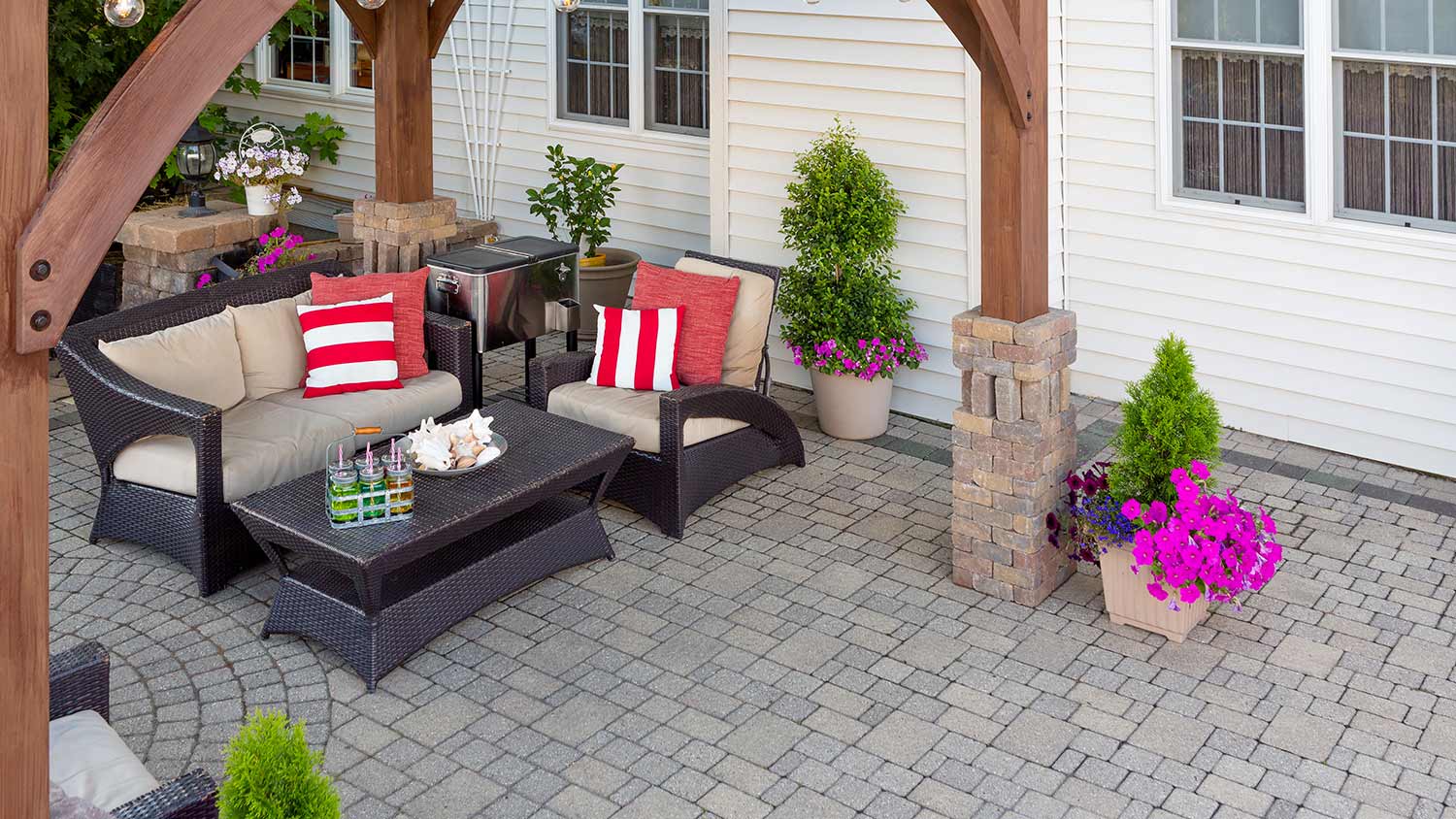
Discover travertine pavers costs to learn about installation, materials, and labor prices, plus tips to save on your travertine paver project.
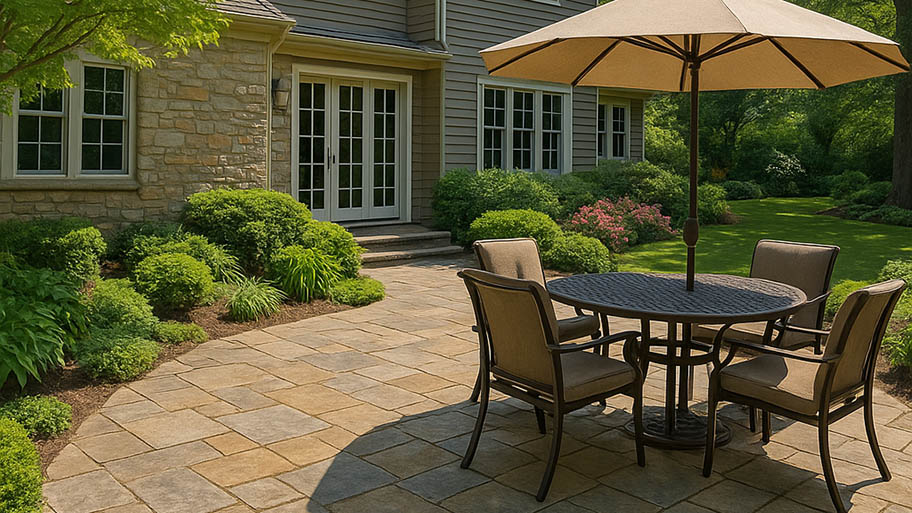
Choose the right material for your patio, walkway, or driveway. Learn the differences between pavers vs. concrete so you can make the right choice for your project.
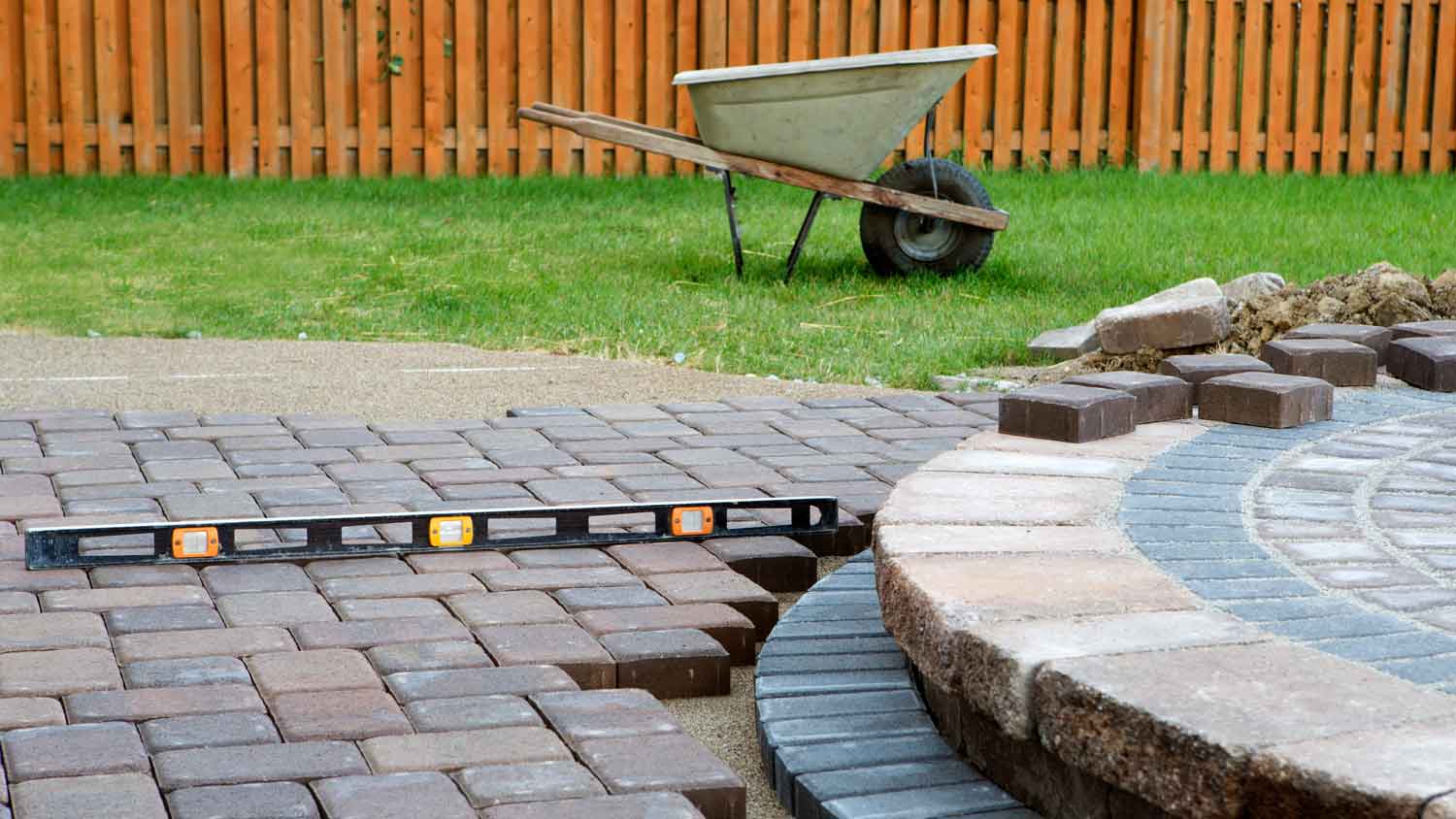
Learn how to fix your paver patio drainage problem by determining the source of the water that is flooding your pavers and causing sinking, cracking, and other issues.
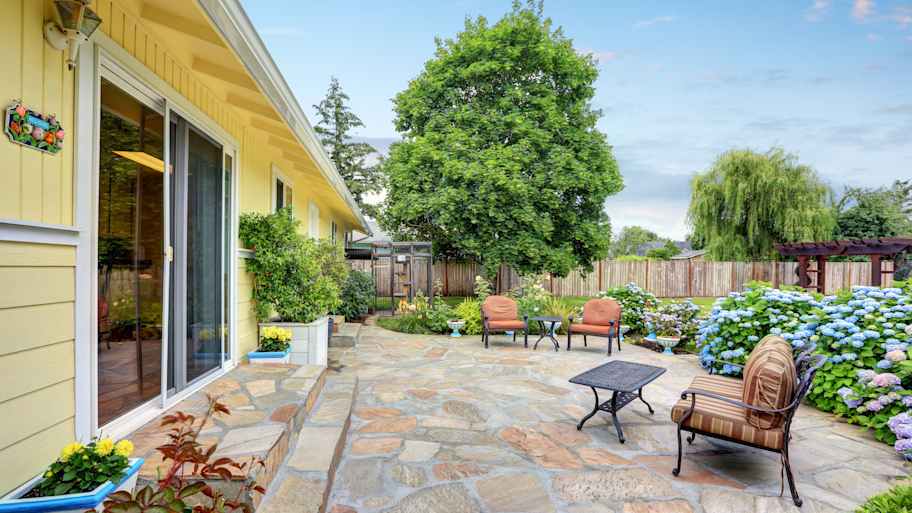
From bricks to blocks and stone projects, our mortar calculator can help you figure out just how much mortar you need so you don’t run out or overdo it.